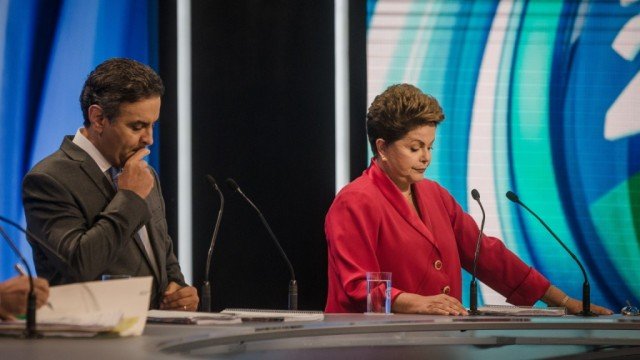Brazil elections 2014: Dilma Rousseff faces Aecio Neves in presidential run-off
Brazilians are voting in the second round of the presidential election in what correspondents say is the tightest vote the country has seen in decades.
Incumbent left-leaning President Dilma Rousseff of the Workers Party (PT) faces centrist Aecio Neves of the Brazilian Social Democracy Party (PSDB) in the second run-off round.
Both candidates have pledged to kick-start Latin America’s largest economy and make it more competitive.
The latest opinion polls showed President Dilma Rousseff with a slight lead over the opposition candidate.
A survey by pollster Datafolha gave Dilma Rousseff 52% voter support against 48% for Aecio Neves.
A separate survey by polling firm Ibope gave the incumbent 53% against 47% for her challenger.
Both polls had a margin of error of plus or minus 2%.

Leftist President Dilma Rousseff faces centrist Aecio Neves in the second run-off round of Brazil’s presidential election
Poor Brazilians, particularly in the impoverished northeast, remain loyal to Dilma Rousseff thanks to her party’s trademark welfare programs, such as the Bolsa Familia grant scheme.
Dilma Rousseff obtained her largest support there in the first round of the presidential election on 5 October, with almost 60% of votes.
But wealthy Brazilians, who are against interventionist economic policies such as petrol price controls and high taxes, favor instead business-friendly Aecio Neves.
Aecio Neves is regarded in the financial markets as someone to put the economy back on track, after four years of low growth rates with the country now technically in recession.
More than 140 million Brazilians will vote on October 26, but correspondents say much will depend on who wins the middle-class vote in the industrialized southeast.
On October 25, Aecio Neves campaigned in his native state, where he served two terms as governor, and paid a visit to the grave of his grandfather Tancredo, who was elected president in 1985 but died before taking office.
Dilma Rousseff, who has been serving as Brazil’s first woman president since 2010, spent instead the last day of campaigning in her southern stronghold of Porto Alegre, the capital of Rio Grande do Sul, where she held a rally.
The vote is widely seen as a referendum on 12 years of government by her Workers Party.
The PT came to power in 2002 with Luiz Inacio Lula da Silva as president.
Its policies are credited with lifting an estimated 40 million Brazilians out of extreme poverty.
However, President Dilma Rousseff’s government has faced allegations of corruption and of overspending in preparations for this year’s football World Cup.
She also presided over rising inflation and a recession this year.
The election comes after weeks of intensive campaigning by the two candidates and a presidential race that turned dramatic after Eduardo Campos, a main opposition candidate, was killed in a plane crash in August.
His running mate, a renowned environmentalist, Marina Silva, was thrust into his spot, vowing to become the South American country’s first “poor, black” president.
Marina Silva came third in the first round after Dilma Rousseff and Aecio Neves secured 41.5% and 33.5% of the vote respectively.
[youtube D-vtpOqUxBk 650]
